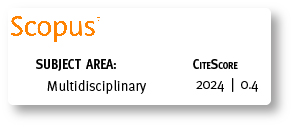The Influence of Internalizing Problems on Social Media Addiction in Young Adults: An Empirical Study
DOI:
https://doi.org/10.18537/mskn.16.01.08Keywords:
internalizing problems, social media addiction, behavioral addiction, young adulthood, psychological distressAbstract
As social media use continues to expand, its potential effects on mental health have become a growing concern, especially for young adults who are among the most active users. This study explores the relationship between internalizing problems—anxiety, depression, and stress—and social media addiction among young adults. A total of 170 participants (aged 18–22 years) completed self-report measures for anxiety, depression, stress and social media addiction. Results indicated a significant relationship between internalizing problems and social media addiction. Participants with higher levels of anxiety, depression, and stress were significantly associated with greater social media addiction. Conversely, those with minimal or no internalizing symptoms had the lowest addiction scores, indicating a direct link between psychological distress and social media addiction.
Downloads
Metrics
References
Aalbers, G., McNally, R. J., Heeren, A., de Wit, S., & Fried, E. I. (2019). Social media and depression symptoms: A network perspective. Journal of Experimental Psychology: General, 148(8), 1454–1462. https://doi.org/10.1037/xge0000528
Achenbach, T. M., Ivanova, M. Y., Rescorla, L. A., Turner, L. V., & Althoff, R. R. (2016). Internalizing/externalizing problems: Review and recommendations for clinical and research applications. Journal of the American Academy of Child & Adolescent Psychiatry, 55(8), 647-656. https://doi.org/10.1016/j.jaac.2016.05.012
Andreassen, C. S., Pallesen, S., & Griffiths, M. D. (2017). The relationship between addictive use of social media, narcissism, and self-esteem: Findings from a large national survey. Addictive behaviors, 64, 287-293. https://doi.org/10.1016/j.addbeh.2016.03.006
Appel, H., Gerlach, A. L., & Crusius, J. (2016). The interplay between Facebook use, social comparison, envy, and depression. Current Opinion in Psychology, 9, 44-49. https://doi.org/10.1016/j.copsyc.2015.10.006
Bányai, F., Zsila, Á., Király, O., Maraz, A., Elekes, Z., Griffiths, M. D., & Demetrovics, Z. (2017). Problematic social media use: Results from a large-scale nationally representative adolescent sample. PLOS ONE, 12(1), e0169839. https://doi.org/10.1371/journal.pone.0169839
Barrault, S., Mathieu, S., Brunault, P., & Varescon, I. (2019). Does gambling type moderate the links between problem gambling, emotion regulation, anxiety, depression, and gambling motives. International Gambling Studies, 19(1), 54-68. https://doi.org/10.1080/14459795.2018.1501403
Boniel-Nissim, Meyran, Marino, Claudia, Galeotti, Tommaso, Blinka, Lukas, Ozoliņa, Kristīne. et al. (2024). A focus on adolescent social media use and gaming in Europe, central Asia and Canada: Health Behaviour in School-aged Children international report from the 2021/2022 survey. World Health Organization. Regional Office for Europe. https://iris.who.int/handle/10665/378982
Brailovskaia, J., Schillack, H., & Margraf, J. (2020). Tell me why are you using social media (SM)! Relationship between reasons for use of SM, SM flow, daily stress, depression, anxiety, and addictive SM use–An exploratory investigation of young adults in Germany. Computers in human behavior, 113, 106511. https://doi.org/10.1016/j.chb.2020.106511
Devi, S., & Singh, S. (2023). Risk factors for drug addiction: A review. Indian Journal of Health and Well-being, 14(3), 383–387. https://iahrw.org/our-services/journals/indian-journal-of-health-wellbeing/
Effatpanah, M., Moharrami, M., Rajabi Damavandi, G., Aminikhah, M., Hosein Nezhad, M., Khatami, F., Arjmand, T., Tarighatnia, H., & Yekaninejad, M. S. (2020). Association of internet addiction with emotional and behavioral characteristics of adolescents. Iranian Journal of Psychiatry, 15(1), 55–66. https://www.ncbi.nlm.nih.gov/pmc/articles/PMC7193233/
Elhai, J. D., Dvorak, R. D., Levine, J. C., & Hall, B. J. (2017). Problematic smartphone use: A conceptual overview and systematic review of relations with anxiety and depression symptomatology. Journal of Affective Disorders, 207, 251–259. https://doi.org/10.1016/j.jad.2016.08.030
Elhai, J. D., Levine, J. C., Dvorak, R. D., & Hall, B. J. (2016). Fear of missing out, need for touch, anxiety and depression are related to problematic smartphone use. Computers in Human Behavior, 63, 509-516. https://doi.org/10.1016/j.chb.2016.05.079
Escobar-Viera, C. G., Shensa, A., Bowman, N. D., Sidani, J. E., Knight, J. M., James, A. E., & Primack, B. A. (2018). Passive and active social media use and depressive symptoms among United States adults. Cyberpsychology, Behavior, and Social Networking, 21(7), 437-443. https://doi.org/10.1089/cyber.2017.0668
Feinstein, B. A., Hershenberg, R., Bhatia, V., Latack, J. A., Meuwly, N., & Davila, J. (2013). Negative social comparison on Facebook and depressive symptoms: Rumination as a mechanism. Psychology of Popular Media Culture, 2(3), 161-170. https://doi.org/10.1037/a0033111
Gupta, M., & Sharma, A. (2021). Fear of missing out: A brief overview of origin, theoretical underpinnings and relationship with mental health. World Journal of Clinical Cases, 9(19), 4881–4889. https://doi.org/10.12998/wjcc.v9.i19.4881
Huang, C. (2020). A meta-analysis of the problematic social media use and mental health. International Journal of Social Psychiatry, 68(1), 12–33. https://doi.org/10.1177/0020764020978434
Hussain, Z., & Griffiths, M. D. (2021). The associations between problematic social networking site use and sleep quality, attention-deficit hyperactivity disorder, depression, anxiety and stress. International Journal of Mental Health and Addiction, 19(3), 686-700. https://doi.org/10.1007/s11469-019-00175-1
Hussain, Z., & Starcevic, V. (2020). Problematic social networking site use: A brief review of recent research methods and the way forward. Current Opinion in Psychology, 36, 89–95. https://doi.org/10.1016/j.copsyc.2020.05.007
Rahma, L., & Setiasih, S. (2021). The impact of social media usage intensity on self-esteem: Survey on emerging adulthood of Instagram user. KONSELI: Jurnal Bimbingan dan Konseling (E-Journal), 8(1), 39–46. https://doi.org/10.24042/kons.v8i1.8313
Karakose, T., Yıldırım, B., Tülübaş, T., & Kardas, A. (2023). A comprehensive review on emerging trends in the dynamic evolution of digital addiction and depression. Frontiers in Psychology, 14, Article 1126815. https://doi.org/10.3389/fpsyg.2023.1126815
Katz, E., Blumler, J. G., & Gurevitch, M. (1973). Uses and gratifications research. Public Opinion Quarterly, 37(4), 509–523. https://doi.org/10.1086/268109
Keles, B., McCrae, N., & Grealish, A. (2020). A systematic review: The influence of social media on depression, anxiety, and psychological distress in adolescents. International Journal of Adolescence and Youth, 25(1), 79-93. https://doi.org/10.1080/02673843.2019.1590851
Kırcaburun, K., & Griffiths, M. D. (2018). Problematic Instagram use: The role of depressive symptoms, perceived belonging, and nostalgia. Addiction Research & Theory, 27(1), 65-73. https://doi.org/10.1007/s11469-018-9895-7
Kircaburun, K., Alhabash, S., Tosuntaş, Ş. B., & Griffiths, M. D. (2020). Uses and gratifications of problematic social media use among university students: A simultaneous examination of the Big Five of personality traits, social media platforms, and social media use motives. International Journal of Mental Health and Addiction, 18, 525–547. https://doi.org/10.1007/s11469-018-9940-6
Kırcaburun, K., Griffiths, M.D. Problematic Instagram Use: The Role of Perceived Feeling of Presence and Escapism. Int J Ment Health Addiction 17, 909–921 (2019). https://doi.org/10.1007/s11469-018-9895-7
Kuss, D. J., & Griffiths, M. D. (2017). Social networking sites and addiction: Ten lessons learned. International Journal of Environmental Research and Public Health, 14(3), Article 311. https://doi.org/10.3390/ijerph14030311
Latkin, C. A., Edwards, C., Davey-Rothwell, M. A., & Tobin, K. E. (2017). The relationship between social desirability bias and self-reports of health, substance use, and social network factors among urban substance users in Baltimore, Maryland. Addictive Behaviors, 74, 12-18. https://doi.org/10.1016/j.addbeh.2017.05.005
Lin, L. Y., Sidani, J. E., Shensa, A., Radovic, A., Miller, E., Colditz, J. B., ... & Primack, B. A. (2016). Association between social media use and depression among US young adults. Depression and anxiety, 33(4), 323-331. https://doi.org/10.1002/da.22466
Lovibond, S. H., & Lovibond, P. F. (1995). Manual for the Depression Anxiety Stress Scales (2nd ed.). Psychology Foundation of Australia.
Marino, C., Gini, G., Vieno, A., & Spada, M. M. (2018). A comprehensive meta-analysis on problematic Facebook use. Computers in human behavior, 83, 262-277. https://doi.org/10.1016/j.chb.2018.02.009
O'Day, E. B., & Heimberg, R. G. (2021). Social media use, social anxiety, and loneliness: A systematic review. Computers in Human Behavior Reports, 3, 100070. https://doi.org/10.1016/j.chbr.2021.100070
Primack, B. A., Shensa, A., Escobar-Viera, C. G., Barrett, E. L., Sidani, J. E., Colditz, J. B., & James, A. E. (2017). Use of multiple social media platforms and symptoms of depression and anxiety: A nationally-representative study among US young adults. Computers in human behavior, 69, 1-9. https://doi.org/10.1016/j.chb.2016.11.013
Przybylski, A. K., Murayama, K., DeHaan, C. R., & Gladwell, V. (2013). Motivational, emotional, and behavioral correlates of fear of missing out. Computers in Human Behavior, 29(4), 1841-1848. https://doi.org/10.1016/j.chb.2013.02.014
Puukko, K., Hietajärvi, L., Maksniemi, E., Alho, K., & Salmela-Aro, K. (2020). Social Media Use and Depressive Symptoms-A Longitudinal Study from Early to Late Adolescence. International journal of environmental research and public health, 17(16), 5921. https://doi.org/10.3390/ijerph17165921
Sahin, C. (2018). Social media addiction scale-student form: the reliability and validity study. Turkish Online Journal of Educational Technology-TOJET, 17(1), 169-182. ERIC Number: EJ1165731
Shannon, H., Bush, K., Villeneuve, P. J., Hellemans, K. G., & Guimond, S. (2022). Problematic social media use in adolescents and young adults: Systematic review and meta-analysis. JMIR Mental Health, 9(4), Article e33450. https://doi.org/10.2196/33450
Stirnberg, J., Margraf, J., Precht, L.-M., & Brailovskaia, J. (2024). The relationship between reasons for smartphone use, addictive use tendencies, fear of missing out, depression, and life satisfaction: A qualitative and quantitative analysis. Psychopathology, 57(3), 359–368. https://doi.org/10.1159/000538263
Spitzer, R. L., Kroenke, K., Williams, J. B. W., & Löwe, B. (2006). A brief measure for assessing generalized anxiety disorder: The GAD-7. Archives of Internal Medicine, 166(10), 1092-1097. https://doi.org/10.1001/archinte.166.10.1092
Sun, Y., & Zhang, Y. (2021). A review of theories and models applied in studies of social media addiction and implications for future research. Addictive behaviors, 114, 106699. https://doi.org/10.1016/j.addbeh.2020.106699
Szuhany, K. L., & Simon, N. M. (2022). Anxiety Disorders: A Review. JAMA, 328(24), 2431–2445. https://doi.org/10.1001/jama.2022.22744
te Brinke, L. W., Menting, A. T., Schuiringa, H. D., Zeman, J., & Deković, M. (2021). The structure of emotion regulation strategies in adolescence: Differential links to internalizing and externalizing problems. Social Development, 30(2), 536-553. https://doi.org/10.1111/sode.12496
Tufekci, Z. (2015). Algorithmic harms beyond Facebook and Google: A research agenda for social media. Proceedings of the 2015 ACM Conference on Fairness, Accountability, and Transparency, 1, 1-15. https://doi.org/10.1145/3287560.3287598
Vannucci, A., Flannery, K. M., & Ohannessian, C. M. (2017). Social media use and anxiety in emerging adults. Journal of Affective Disorders, 207, 163-166. https://doi.org/10.1016/j.jad.2016.08.040
Wegmann, E., Stodt, B., & Brand, M. (2017). Online-specific fear of missing out and its relationship with social media addiction and mental health. Computers in Human Behavior, 68, 125-134.https://doi.org/10.1016/j.abrep.2017.04.001
White-Gosselin, C.-É., & Poulin, F. (2024). Associations between young adults’ social media addiction, relationship quality with parents, and internalizing problems: A path analysis model. Canadian Journal of Behavioural Science / Revue canadienne des sciences du comportement, 56(1), 61–69. https://doi.org/10.1037/cbs0000326
Yaqoob, M. D., Cho, W., Saleem, K., Anjum, K., Dou, M., Feng, X., & Chattha, H. (2024). The relationship between social media use and adolescent mental health: A systematic review. Systems Psychology and Sociology, 2(50), 77–96. DOI: 10.25688/2223-6872.2024.50.2.7
Downloads
Published
How to Cite
Issue
Section
License
Copyright (c) 2025 Iason Psiachos, Miguel Ángel, Pablo Holgado-Tello

This work is licensed under a Creative Commons Attribution-NonCommercial-ShareAlike 4.0 International License.
Copyright © Autors. Creative Commons Attribution 4.0 License. for any article submitted from 6 June 2017 onwards. For manuscripts submitted before, the CC BY 3.0 License was used.
![]()
You are free to:
 |
Share — copy and redistribute the material in any medium or format |
 |
Adapt — remix, transform, and build upon the material for any purpose, even commercially. |
Under the following conditions:
 |
Attribution — You must give appropriate credit, provide a link to the licence, and indicate if changes were made. You may do so in any reasonable manner, but not in any way that suggests the licenser endorses you or your use. |
| No additional restrictions — You may not apply legal terms or technological measures that legally restrict others from doing anything the licence permits. |









